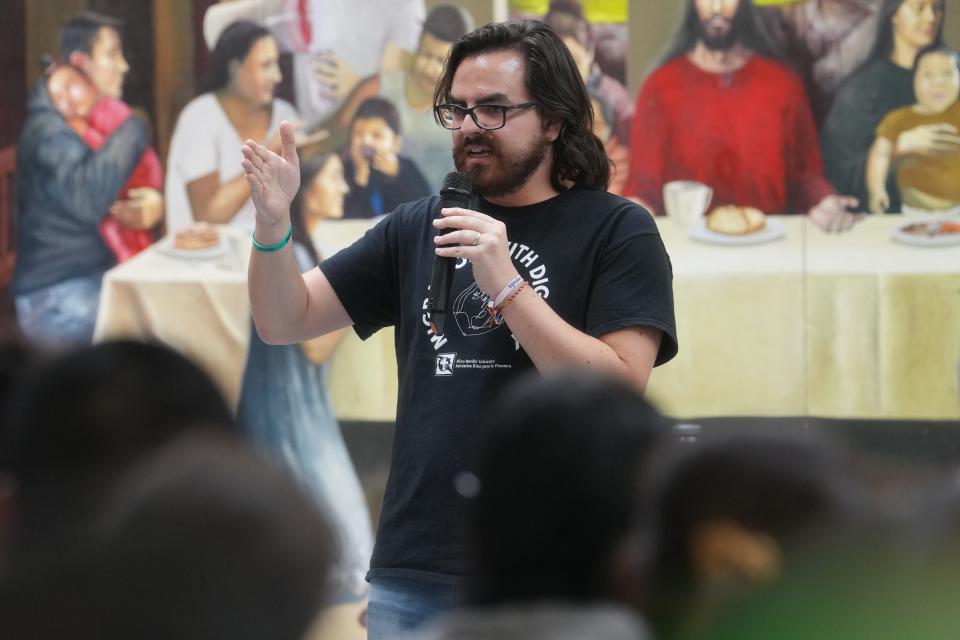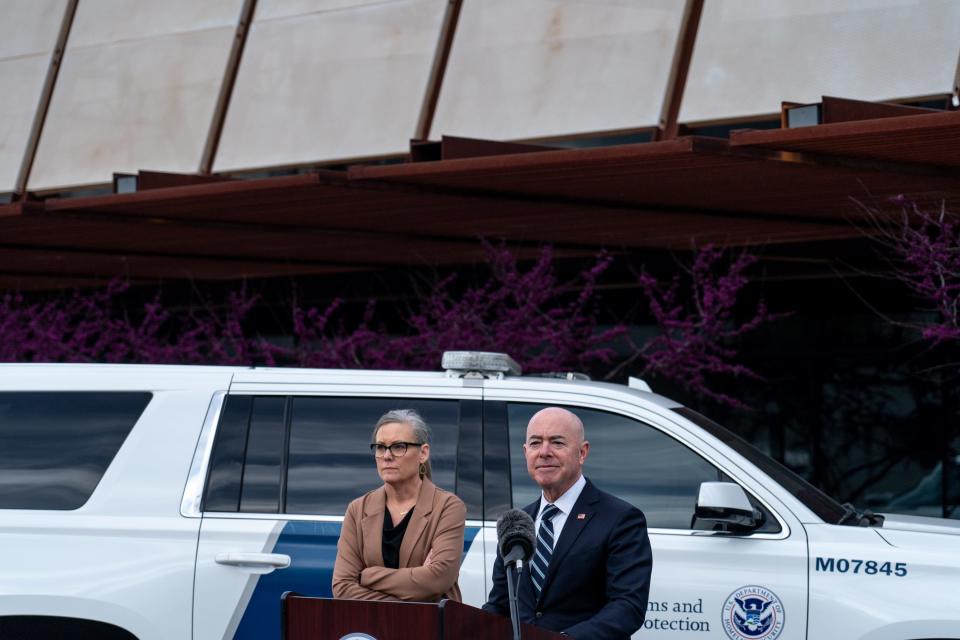Migrant advocates say Border Patrol separates families before deportation
Migrant advocates claim there is an increase in “unnecessary” family separations at the U.S.-Mexico border and are documenting stories of migrant mistreatment while in the U.S. Border Patrol's custody.
One month after President Joe Biden announced restrictions to access asylum along the border, advocates said they are seeing an increase in family members arriving at the border together but are separated at the border, and often returned to Mexico with no idea where their relatives are.
The president's executive action allows the U.S. Border Patrol to shut down all asylum processing under sections 212(f) and 215(a) of the U.S. Immigration and Nationality Act when the number of migrant crossings in between the ports of entry exceeds 2,500 per day over a seven-day period.
Processing would resume when the number of migrant crossings falls below 1,500 per day over a seven-day period. The order would not impact asylum processing at legal border crossings.
Since the Kino Border Initiative in Ambos Nogales started to track high numbers of Mexicans returned to Mexico with no chance at seeking asylum, the organization has met migrants who have lost touch with their family members after agents sent them back. The Kino Border Initiative found 101 instances over two weeks with 78% of these incidents involving separation from parents, spouses, children or siblings.
“Now what we are seeing is they're unnecessarily punishing people, separating grandparents from their granddaughters, separating siblings or separating, aunts or uncles from their nieces and nephews and, and sending them (back) through different ports of entry" and at different hours of the day, said Pedro De Velasco, the director of education and advocacy of the Kino Border Initiative.

In one example documented by Kino Border Initiative, a woman was separated from her brother and granddaughter after they presented themselves to the U.S. Border Patrol. They requested asylum, but the woman was deported back to Mexico, while her granddaughter remained under Border Patrol custody. The woman did not know what happened to her granddaughter.
In another instance, the organization spoke to a man who left his small town in Jalisco, Mexico after organized crime groups threatened and extorted him. They charged him 20,000 pesos ($1,090 USD) a month. He traveled to the U.S. with his 13-year-old son. After turning themselves to the U.S. Border Patrol, agents kept them separated from each other and refused to tell the man about his son’s whereabouts for two days until they were both deported to Nogales.
Organizations in other parts of the U.S.-Mexico border have also been documenting family separations since Fall 2023, around the time that migrant advocate organization Al Otro Lado and several other groups filed a complaint with the U.S. Department of Homeland Security. From mid-September to June 19, Al Otro Lado documented 1,497 instances of family separation with migrants released at the San Ysidro Transit Center in San Diego, California.
According to U.S. Customs and Border Protection, San Diego sees about half of the volume of migrants than Tucson in its 56,381 square miles of coverage. The Tucson sector, which covers 262 border miles had 406,441 migrant and border patrol encounters compared to 255,343 in San Diego. However, the number of people presenting themselves at ports of entry with appointments made through the agency's CBP One app is much higher in San Diego with 123,000 appointments this year compared to 32,000 in the Tucson field office.
De Velasco reiterated how separating families goes against guidelines published by U.S. Customs and Border Protection. Biden also asserted this sentiment in an ad against Donald Trump, where he criticized Trump's separation policy which was in place between 2017 and 2018.
In a memorandum from April 2023, Troy Miller, the senior official performing the duties of the commissioner for U.S. Customs and Border Protection, said the agency seeks to keep family groups together. Family groups include parents, grandparents, or legal guardians with their unmarried children between the ages of 18 to 25; spouses 18 and older or unmarried siblings between the ages of 18 and 25.
If the members of the group cannot provide documentation, “CBP officers and agents will not record or link the individuals as a family group and continue to process the individual(s) as a single adult,” reads the memorandum on Additional Guidance on Recordation, Linking, and Processing of Family groups.
In a comment to The Arizona Republic, the agency said agents try to keep family groups together, but family members will be released at different times if they are in different stages of processing or prosecution.
Migrants say they are mistreated while in custody
Migrants also are reporting physical and verbal abuse, poor detention conditions and personal belongings that are not returned, per the Kino Border Initiative.
During a news conference in Tucson, Homeland Security Secretary Alejandro Mayorkas said agents take individuals' belongings for the safety of the agents and the people in Border Patrol custody. He reiterated that the items are returned when people are moved to a different facility or deported.
One migrant who spoke to the Kino Border Initiative said she was traveling with her mother and two-year-old daughter. They tried to ask for asylum, but they weren’t allowed to speak, and she said she was scared to insist. While detained, a Border Patrol agent yelled at her baby girl and startled her. He and the other agents reportedly laughed at her.
Another migrant who spoke to the Kino Border Initiative was separated from the father of her child and deported alone to Nogales.
She reportedly told advocates that while in detention, a Border Patrol agent used profanity in referring to her and the people she was detained with.
When she tried to ask for asylum, an infuriated agent scolded her.
“Do you think you have the same rights as I do?! The government deducts $1,000 from every paycheck I earn just so that any idiot can show up here,” he said, according to the nonprofit.
According to the CBP, formal complaints made of mistreatment are thoroughly investigated.
De Velasco said the investigations take too long to investigate. In June, the Kino Border Initiative received a reply from a complaint submitted in August 2021.
In response to the complaints, De Velasco said he often receives the same canned response noting that the information was recorded in the Office of Civil Rights and Civil Liberties database and that no further action will be taken.
Migrants deported with no paperwork
De Velasco said advocates are also seeing migrants deported to Mexico without paperwork. One woman who spoke to the Kino Border Initiative only had a Post-it note that said “five years” and told her that was how long she was barred from reentering the U.S.
According to CBP, paperwork is only given to migrants deported back to Mexico if they go through the expedited removal process, not the voluntary return process.
Voluntary return requires someone to voluntarily leave the country. This process allows them to apply for an appointment with immigration officers through the CBP One app. The other form of removal, the expedited removal process, allows some migrants to be considered for a credible fear screening if they manifest fear of returning to their home country. However, it also bans migrants from reentering the U.S. for at least five years if they are returned to their home country.
With 1,450 daily appointments, migrant advocates are asking Congress to allocate additional funding to increase the number of appointments.
“It is currently the only way for people to access asylum from the U.S.-Mexico border, and there are only 1,450 appointments available each day, distributed among the eight eligible ports of entry, which are insufficient to meet current need,” said the Kino Border Initiative in an update to Congress from June 27.
While in Tucson, Mayorkas said there are no plans to increase the number of available appointments because the limit of appointments per day is based on the capacity of the ports of entry.

Reach the reporter at sarah.lapidus@gannett.com. The Republic’s coverage of southern Arizona is funded, in part, with a grant from Report for America. Support Arizona news coverage with a tax-deductible donation at supportjournalism.azcentral.com.
This article originally appeared on Arizona Republic: Advocates say Border Patrol separates families before deportation

